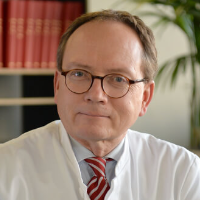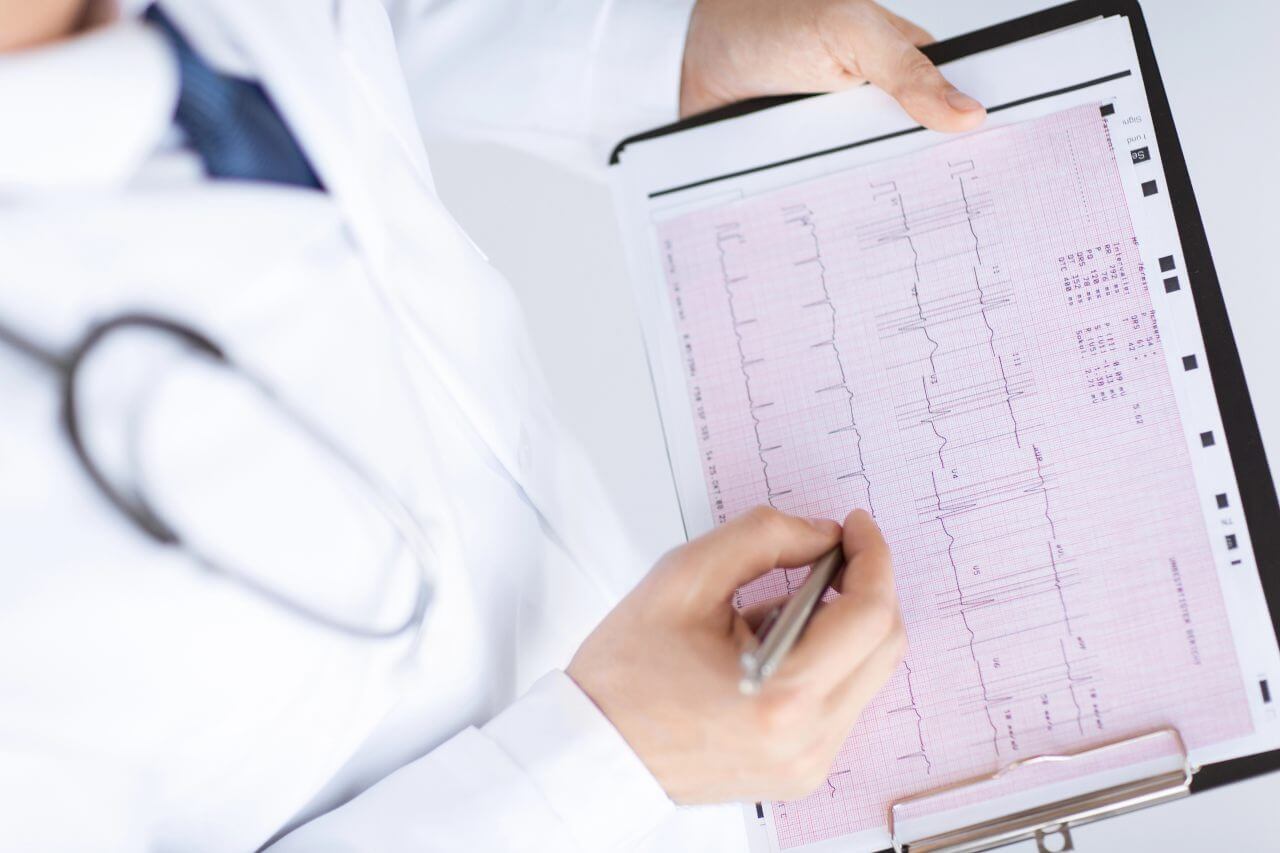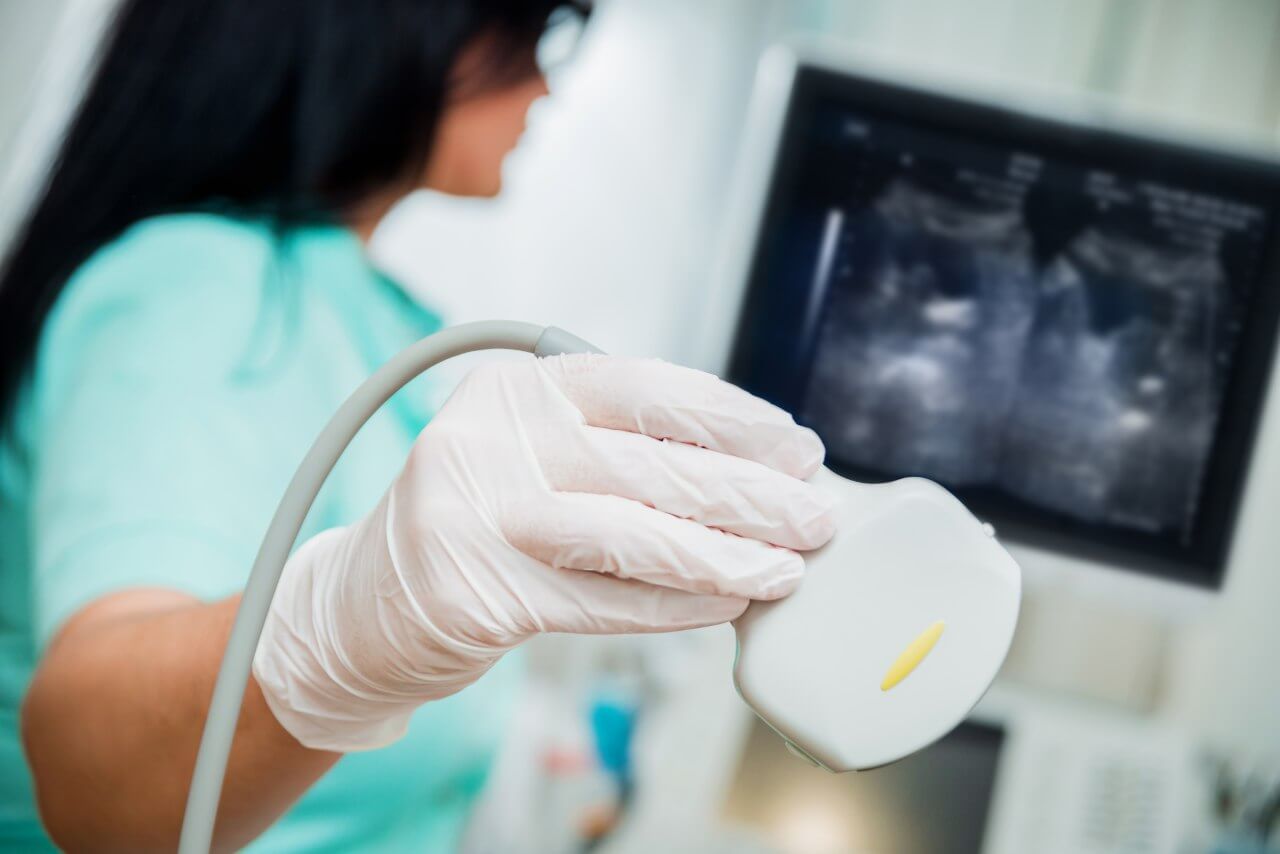
The program includes:
- Interview with doctor, medical history taking
- general clinical examination
- vascular system assessment
- extended blood test:
- thyroid function test (TSH, fT3, fT4)
- mineral metabolism analysis (Na, K, Ca, Mg)
- lipid metabolism (HDL/LDL, cholesterol,
triglycerides Lip(a), homocysteine) - indicators of blood coagulation (aPTT, PT, INR)
- metabolic status (uric acid, glucose)
- iron content (ferritin, iron)
- inflammatory parameters (CRP, ESR)
- immune status (protein electrophoresis)
- lung function test (spirometry)
- resting and exercise ECG
- color doppler echocardiography
- color doppler sonography of cerebral vessels
- CT angiography of coronary vessels (if clinically indicated, additional cost is 1000 €)
- fundus examination (in hypertension)
- interview and recommendations after examination
- written statement
Required documents
- Medical records (if availale)
Service
You may also book:
 BookingHealth Price from:
BookingHealth Price from:
About the department
The Department of Cardiology at the Cardiology Clinic Nixdorff & Vester Duesseldorf provides the full range of medical services in its area of specialization. The department admits patients with various heart diseases, with a special focus on the diagnosis and treatment of cardialgia of unknown origin, heart failure, coronary heart disease, congenital and acquired heart valve defects, arrhythmias, myocarditis, arterial hypertension, and heart damage due to diabetes mellitus and morbid obesity. The department is proud of its excellent diagnostic facilities. It has state-of-the-art equipment for electrocardiography, long-term Holter ECG monitoring, transthoracic and transesophageal echocardiography, 24-hour blood pressure monitoring, duplex sonography, pulmonary function testing, cardiac CT, cardiac MRI, and myocardial perfusion scintigraphy. The healthcare facility also offers a comprehensive Check-up to assess your health status and identify potential risks of developing heart disease. The department's doctors also offer second opinions. Should there be any pathological changes in the functioning of the heart, the department's cardiologists will prescribe the patient an individual drug treatment regimen and give recommendations for lifestyle modification. Medical care is provided by competent cardiologists who have encountered clinical cases of varying complexity over their many years of practice.
The department is headed by Prof. Dr. med. Uwe Nixdorff. He is one of the best cardiologists in Germany, who conducts successful clinical practice, is engaged in research, and participates in the work of professional cardiological societies in Europe and America. Prof. Nixdorff's clinical priority is preventive cardiac examinations. He is the Founder and Director of the European Prevention Center (EPC) in Duesseldorf and Berlin, which has gained a reputation as one of the best healthcare facilities of its kind in Germany.
The department has accumulated extensive experience in the diagnosis and treatment of heart failure. This pathology affects the pumping function of the heart, which disrupts the blood supply to tissues and organs. In the early stages, symptoms of heart failure manifest themselves only during physical activity, but they are also present at rest as the disease progresses. In the advanced stages of heart failure, other internal organs may also be affected, resulting in the development of concomitant pathologies and life-threatening conditions. Should heart failure be suspected, the department's cardiologists conduct a comprehensive diagnosis of the heart, which is based on electrocardiography, echocardiography, chest X-rays, 24-hour blood pressure monitoring, and stress tests. Laboratory tests such as a complete blood count, urinalysis, and blood biochemistry tests are mandatory. Timely and competently selected treatment for heart failure can compensate for impaired heart function and significantly improve the patient’s quality of life. Treatment tactics depend on the form of the heart disease: acute heart failure requires emergency medical care in a hospital setting, while chronic heart failure requires a long course of maintenance drug treatment. Diet, changing physical activity levels, and giving up bad habits play an important role.
Coronary heart disease (CHD) is one of the most common diagnoses in cardiology. The department's doctors examine patients suspected of this disease almost every day. Coronary heart disease is a chronic pathology that develops against the background of the formation of atherosclerotic plaques in the coronary arteries. The formation of plaques leads to a narrowing of the lumen of the affected blood vessels and disruption of the blood supply to the heart muscle. The early stages of coronary artery disease are practically asymptomatic, so the department's cardiologists attach great importance to regular preventive examinations, which allow for timely detection of atherosclerosis of the coronary arteries and the performance of the necessary therapeutic measures. The main manifestations of CHD include shortness of breath, heart rhythm disturbances, elevated blood pressure levels, and squeezing and pressing pain in the heart area. As ischemia worsens, there is a risk of developing acute coronary syndrome, which poses a potential threat to human life. Diagnosis for suspected coronary artery disease includes electrocardiography, echocardiography, Holter monitoring, 24-hour blood pressure monitoring, stress tests, coronary angiography, blood tests, and urinalysis. The department's cardiologists provide conservative treatment for coronary artery disease, which includes regular dosed physical activity (swimming, walking, gymnastics, exercises on special fitness equipment, etc.), diet (fatty and salty foods are excluded from the diet), giving up bad habits, eliminating stressful situations as much as possible in everyday life, and drug therapy (anti-ischemic drugs, antiplatelet agents, beta blockers, calcium channel antagonists, diuretics, etc.). If conservative therapy fails, the specialists recommend coronary balloon angioplasty with stenting or coronary artery bypass grafting, depending on individual clinical indications. These procedures physically remove atherosclerotic plaque from the coronary arteries or create new blood supply pathways to the myocardium.
One of the key clinical focuses for the department’s cardiologists is also the treatment of arrhythmias, a pathological condition associated with disturbances in the rhythm, frequency, and regularity of heart contractions. Arrhythmia may affect both people of young and old age, so if you have specific complaints, you should consult a cardiologist and undergo an examination. The main manifestations of arrhythmia include a clearly felt heartbeat (rapid or slow), attacks of shortness of breath, dizziness, loss of consciousness, chest pain, and weakness. The diagnosis begins with a clinical examination, followed by electrocardiography, which is the main diagnostic method for suspected arrhythmia. For appropriate clinical indications, the cardiologist also performs long-term Holter monitoring, echocardiography, blood biochemistry tests, and urinalysis. The department's specialists prescribe treatment on an individual basis, taking into account the type of arrhythmia. As a rule, arrhythmias respond well to drug therapy, so cardiologists prescribe antiarrhythmic drugs, antihypertensive drugs, vitamin complexes, etc. The therapeutic process also includes physical therapy, diet, and quitting smoking and drinking alcohol.
The department's range of medical services includes the following:
- Diagnostic services
- Laboratory tests: a complete blood count, urinalysis, biochemical blood tests, etc.
- Bioelectrical impedance analysis
- Electrocardiography, including Holter monitoring for 1-3 days
- 24-hour blood pressure monitoring
- Duplex sonography
- Transthoracic and transesophageal echocardiography
- Stress echocardiography
- Pulmonary function tests
- Cardiac computed tomography
- Cardiac magnetic resonance imaging
- Myocardial perfusion scintigraphy
- Ergospirometry (cardiopulmonary exercise testing)
- Heart rate variability assessment
- Pulse-wave velocity assessment
- Determination of advanced glycation end products using the AGE Reader®
- Therapeutic services
- Drug therapy
- Individual recommendations for lifestyle modifications
- Second opinion
- Other diagnostic and treatment methods
Curriculum vitae
Higher Education and Professional Career
- 1978 - 1985 Medical studies, Johann Wolfgang Goethe University Frankfurt.
- 1981 Internship, University of the Witwatersrand, Chris Hani Baragwanath Hospital, Johannesburg, South Africa.
- 1985 - 1986 Medical Service Captain, Department of Internal Medicine, Bundeswehr Hospital Giessen.
- 1986 - 1987 Assistant Physician, German Heart Center, Munich.
- 1987 - 1998 Assistant Physician, Department of Cardiology, University Hospital Mainz.
- 1988 Research Fellow, Department of Cardiology, Michael Reese Hospital, Chicago, USA.
- 1989 Research Fellow, School of Medicine, Department of Cardiology, University of Virginia, Charlottesville, USA.
- 1989 Research Fellow, Non-Invasive Cardiology Laboratory, Massachusetts General Hospital, Harvard Medical School, Boston, USA.
- 1988 - 1990 Emergency Medicine Physician, Buedingen, Germany.
- 1990 - 1998 Head, Department of Cardiology, Hofheim am Taunus.
- 1998 - 2004 Senior Physician, Department of Cardiology, University Hospital Erlangen.
- 2004 Advanced training, Cooper Institute, Dallas, USA.
- Since 2005 Founder and CEO, European Prevention Center (EPC) in Berlin and Duesseldorf.
- 2006 Research Fellow, Leibniz Institute for Atherosclerosis Research at the Westphalian Wilhelm University of Muenster.
- 2007 - 2010 Founder and Director of a Private Cardiology Clinic in Duisburg.
- Since 2010 Founder and Director of the Cardiology Clinic Nixdorff & Vester Duesseldorf.
- 2010 - 2016 Master of Science in Preventive Medicine, Visiting Professor Master's Programme, International University Dresden.
- Since 2015 Founder and Managing Director, Hanako GmbH.
- Since 2020 Founder and Managing Director, European Center for Personalized Medicine (ECPM GmbH).
Prizes, Awards, and Honors
- 1988 Young Investigator Award from the International Council of Electrocardiology.
- 1996 Best Abstract Award – Honorable Mention from the International Society of Cardiovascular Ultrasound.
- 1996 Award for raising the status and contribution to the success of the 2nd World Congress of Echocardiography and Vascular Ultrasound, held in Beijing, China.
- 1996 Poster Award, 8th Essen-Mayo-Mainz Symposium.
- 1998 Who is who in the Federal Republic of Germany?, Biographical encyclopedia of leading men and women "Hübner's Blaues Who is Who".
- 1998 Who is who in the world?, The Marquis Who's Who publishing Board.
- 1998 Who's Who in Science and Engineering?, The Marquis Who's Who publishing Board.
- 2000 Who's Who in Medicine and Healthcare?, The Marquis Who's Who Publishing Board.
- 2000 New Century Award, Barons Who's Who Publishing Board.
- 2000 Fellow of the European Society of Cardiology (FESC).
- 2001 Honour of an Outstanding Contribution in the Field of Cardiology: Outstanding Intellectuals of the 21st Century; International Biographical Centre Cambridge, England.
- 2002 Honorary Knight of the Order of St John, Bailiwick of Brandenburg of the Chivalric Order of Saint John of the Hospital at Jerusalem.
- 2002 Outstanding Europeans of the 21st Century, International Biographical Centre Cambridge, England.
- 2002 International Scientist of the Year.
- 2005 Second Prize from the Friedrich Alexander University of Erlangen-Nuremberg, Business Plan Competition in Northern Bavaria, European Prevention Center (EPC).
- 2005 First Prize in the Business {lan Competition in Rhine-Main, European Prevention Center (EPC).
- 2007 Order of St John of Jerusalem, Bailiwick of Brandenburg of the Chivalric Order of Saint John of the Hospital at Jerusalem.
- 2016 Reviewer Award, European Journal of Preventive Cardiology (EJPC).
- 2017 Elite Reviewer Award, European Heart Journal (EHJ).
- 2018 Reviewer Award, European Heart Journal – Cardiovascular Imaging (EHJCVI).
- 2018 Honorary Knight of the Order of St John, Bailiwick of Brandenburg of the Chivalric Order of Saint John of the Hospital at Jerusalem.
- 2021, 2022 and 2023 Ranked as Top Cardiologists in Sports Medicine in Germany by Focus.
Memberships in Professional Societies
- European Society of Cardiology (ESC).
- European Association of Echocardiography (EAE).
- European Association of Preventive
- Cardiology (EAPC).
- German Cardiac Society (DGK).
- American Heart Association (AHA).
- American Society of Echocardiography (ASE).
- International Society of Cardiovascular Ultrasound (ISCU).
- Society of Cardiovascular Computed Tomography (SCCT).
- New York Academy of Science (NYAS).
- German Society of Internal Medicine (DGIM).
- Professional Association of German Internists (BDI).
- German Society for Ultrasound in Medicine (DEGUM).
- German Society for Sports Medicine and Prevention (DGSP).
- German Heart Foundation.
- German Society for Prevention and Anti-Aging Medicine (GSAAM).
- German Hypertension League (DHL).
- Society for Prevention (GPeV).
Photo of the doctor: (c) Kardiologische Privatpraxis Nixdorff & Vester
About hospital
The Cardiology Clinic Nixdorff & Vester Duesseldorf is a private clinic whose specialists offer patients with heart disease modern diagnostics and treatment in a pleasant and comfortable environment. The clinic was opened by Prof. Uwe Nixdorff in 2011. It is part of the European Prevention Center (EPC), one of the best facilities of its kind in Germany. Prof. Uwe Nixdorff works hand in hand with Prof. Ernst Vester. Both cardiologists have extensive clinical experience and successfully apply it for the benefit of their patients. The doctors' priorities include cardiac examinations and comprehensive Check-up programs, as well as second opinions for suspected heart disease.
The clinic regularly admits patients with cardialgia of unknown origin, heart failure, coronary heart disease, congenital and acquired heart valve defects, arrhythmias, myocarditis, arterial hypertension, and heart damage due to diabetes mellitus and morbid obesity.
The clinic is equipped with the latest generation of diagnostic equipment for electrocardiography, including Holter ECG monitoring for 1-3 days, transthoracic and transesophageal echocardiography, 24-hour blood pressure monitoring, duplex sonography, and lung function testing. Patients also undergo cardiac computed tomography, cardiac magnetic resonance imaging, and myocardial perfusion scintigraphy. The medical facility has a technical base for conducting a wide range of laboratory diagnostics. Diagnostic results are stored in a specialized picture archiving and communication system (PACS), which is based on the use of the latest information technologies. The system guarantees unimpeded access to patient diagnostic results for doctors from other clinics. All you need to do is scan a QR code.
The clinic's therapeutic offer includes comprehensive drug treatment and individual recommendations for lifestyle modification in cases of heart disease or a high risk of developing it. The "second opinion" service is also demanded here. If interventional catheter-based treatment or surgery is required, the patient is referred to a specialized clinic.
In addition to providing top-class medical services, the Cardiology Clinic Nixdorff & Vester Duesseldorf takes care of the patient's comfort and pays attention to their needs. The medical team shows a humane attitude and surrounds the patient with care. The patient is always at the very center of the clinic's doctors' efforts.
Photo: (с) depositphotos
Accommodation in hospital
Hotel
You may stay at the hotel of your choice during the outpatient program. Our managers will support you for selecting the best option.




